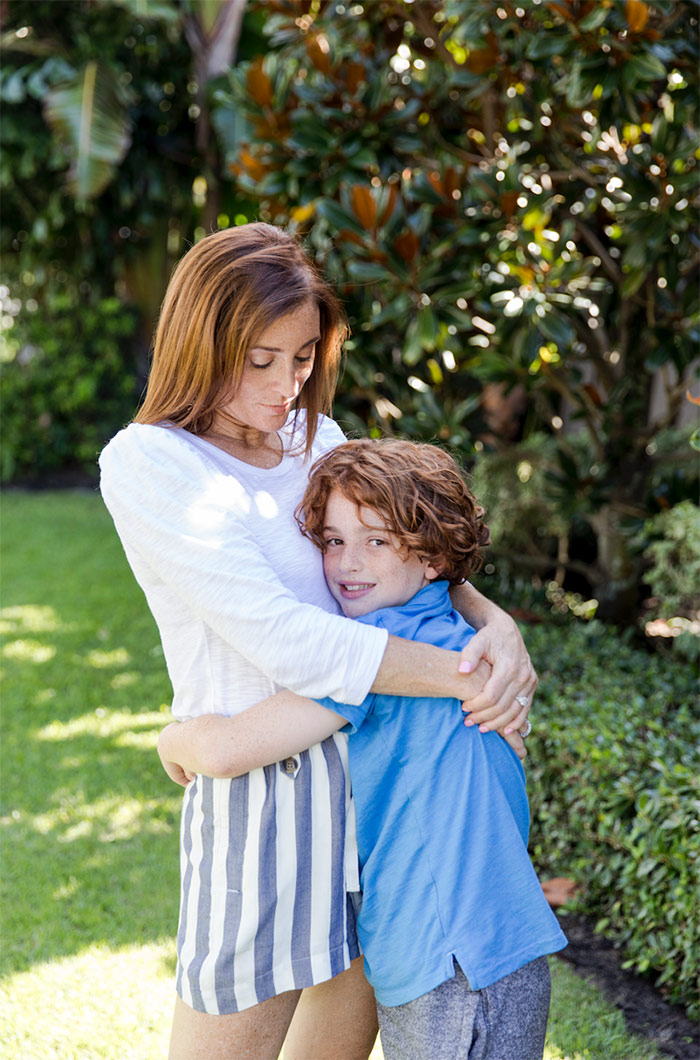
What We Can Do Today To Help Our Children Fight Peer Pressure Tomorrow
As parents raising children in a world obsessed with likes and follower counts, we have to worry a lot more about the intensified pressure social media puts on our children to be popular and fit in. Whether pressure to look a certain way, post the perfect picture, or gain so many likes, more than ever our children are faced with peer pressure and the stress of fitting in. Working in a pediatric emergency room, I see firsthand the dramatic effects social media has on our adolescences’ mental health and development. We have to work even harder as parents and start even earlier giving our children the tools for overcoming peer pressure and developing a healthy relationship with themselves.
As early as the age of 3, children start to understand the concept of friendship. They feel sadness when they are not included and feel rewarded when their peers give positive feedback. There is nothing more heartbreaking than your child telling you “nobody” likes them or they have “no friends.” We immediately start drafting the email to the teacher in our heads. However, instead of fixing our children’s problems for them, it is important that we use these teachable moments to build the foundation of self worth and healthy friendships. Building positive, strong friendships will inevitably give them the confidence to make the right decisions as they get older and are faced with overcoming peer pressure and making decisions in difficult situations.
#TalkEarly Summit
We were fortunate enough to get to attend the #TalkEarly Summit in Washington last year. We were able to sit down with Phyllis Fagell, a licensed clinical professional counselor, certified professional school counselor, and journalist, and ask her what we can do today to help our children fight peer pressure tomorrow. Phyllis went on to discuss these early childhood friendships and the impact those friends can have. Her message has a strong meaning when applied to building friendships, especially in early childhood through adolescence. Below are five of the most common questions/concerns Phyllis gets from parents about kids, friendships, and overcoming peer pressure along with some suggestions for tackling these issues.
1. How do you help your child handle comments from kids like, “You’re not in the club,” or “You always have to be the baby or the dog in our game”?
Kids who hear these phrases from other kids tend to be less assertive, in general. It is important to teach them to be assertive in their own way. Explain to them that they don’t always have to be the leader but that it is important to speak up if they feel they aren’t being treated fairly.
Start by asking, “How did the situation make you feel and what did you do to correct it?” Validate that it’s really hard to stand up to people sometimes, but don’t be over-reactive. Give your kids language to use next time, such as, “You chose the rules last time; I’d like to choose the rules this time.”
This moment is also a great time to teach your child about confident body language. Stress to them that they need to stand up straight and look people in the eye when they are talking to them.
2. How do you help your child who never wants to have friends come over to play? Should you invite them anyway?
This one is especially challenging for an extroverted parent who has an introverted kid. An introverted child has used all their energy getting through the school day – some need the weekend to recover. It is important to ask yourself as the parent if this anxiety belongs to you or your child.
Many of us feel a pressure for our child to be well liked when many children are fine with one or two great friends. Try to honor your child for who they are, and don’t force them to be social when they need alone time to unwind and recharge.
Talk to your child’s teacher about your concerns. You might discover that your child is very social during the school week and doesn’t feel they need a playdate after school or on the weekends.
3. My child has a lot of friends, but I am having a hard time with her being too bossy.
Many times in early elementary school, the children that are more assertive tend to have more friends. They typically are the leaders during pretend play and frequently dictate who is in the group and who isn’t.
The real question should be about teaching likability vs. trading on power. Phyllis noted, “If you trade on power and aggression to get your popularity, it will pay off until 12th grade because people fear you. But it becomes a real negative after high school, with higher rates of depression and substance abuse.”
It is important that if your child falls into this category, you make sure to teach them the lessons of inclusion and giving everyone a turn to make up the rules of the game. When they talk to you about their playdates, ask them specifically what they did to include others. A great exercise is to ask them every night to tell you one nice thing they did for someone at school today and one nice thing someone did for them.
Responsibility.org has an excellent resource page for parents, which includes video of Phyllis discussing teens and mental health.
4. Concerns that no one invites your child over – should you worry?
It is important to establish what is causing your child not to be included. Talk to other adults in their lives – teachers, coaches, counselors. Observe the way your child interacts with other children in a school setting and on a playdate.
Is it something they are doing or is it that they don’t need a lot of friends?
I feel that finding your child’s passion not only helps foster friendships with other children with similar interests but also helps your child build self confidence. Sports clubs, music lessons, and art classes are great ways for your child to meet children outside of school. Remember, it isn’t about being popular but rather about building strong friendships. Having one or two amazing friends is more important than having 100 likes on a picture.
5. Concerns about negativity, such as, “My son is super negative – always saying, ‘No one likes me or wants to play with me.”
Phyllis acknowledged that it can be very draining when you have what she described as an “Eeyore” kid. She recommends playing the “highs and lows” exercise because you help your child reframe situations. If they are torn, you can help them come up with something positive. She also recommends having your child keep a gratitude journal – write down three things they are grateful for every day. They could also keep a kindness journal – things they did for others or others did for them. She noted that often kids who are negative don’t have a full emotional vocabulary. Humans are wired to remember the negative instead of the positive. Teach them to consider the other perspective. Play the “maybe game’ – maybe they were hungry, maybe they were in a bad mood – this helps them to get outside their own head and consider the other possibilities.
Final Thoughts on Building Strong Friendships and Overcoming Peer Pressure
One of the topics Phyllis discussed that truly resonated with me was the focus on the phrase, ‘If you give people the power to validate you, you also give them the power to invalidate you.’
The kids your children surround themselves with now will one day either provide validation or have the ability to break down your child’s self confidence. A lack of self confidence will have a huge impact on your child’s decisions when pressured. They will look to their friends for guidance in these situations instead of trusting their own decisions. So making sure your child is surrounded by healthy, positive friendships NOW is the key to overcoming peer pressure in the future.
As we head into Red Ribbon Week, your children will likely be discussing the dangers of drugs and how to say NO in school. It’s important to reinforce these ideas at home. Think about shaping your little ones for the pressures and tough decisions they’ll face in the years to come. Building self confidence and awareness at an early age is paramount in helping our kids make the right decisions in their tween and teen years, especially in regards to underage drinking. The key is teaching our children to surround themselves with positive, healthy friendships. It’s one of the best gifts we can give as parents!
~Dr. Katie
Phyllis Fagell has a new book just released in August to rave reviews – Middle School Matters! And for more on her #TalkEarly Summit discussions, check out the video below.



